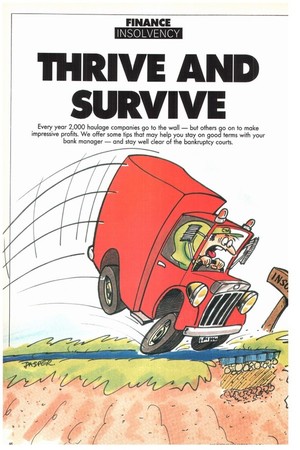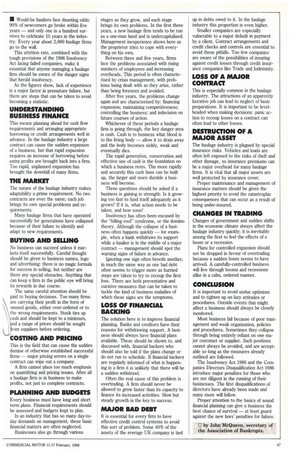THRIVE
Page 56

Page 57

If you've noticed an error in this article please click here to report it so we can fix it.
AND SURVIV E
/ Would-be hauliers face daunting odds: 90% of newcomers go broke within five years — and only one in a hundred survives to celebrate 10 years in the industry. Every year about 2,000 haulage firms go to the wall.
This attrition rate, combined with the tough provisions of the 1986 Insolvency Act facing failed companies, make it essential that anyone managing a haulage firm should be aware of the danger signs that herald insolvency.
As the figures show, lack of experience is a major factor in premature failure, but there are steps that can be taken to avoid becoming a statistic.
This means planning ahead for cash flow requirements and arranging appropriate borrowing or credit arrangements well in advance. In the haulage industry a large contract can cause the sudden expansion of a business, but that rapid expansion requires an increase of borrowing before extra profits are brought back into a firm. Too rapid, unplanned expansion has brought the downfall of many firms.
The nature of the haulage industry makes adaptability a prime requirement. No two contracts are ever the same; each job brings its own special problems and requirements.
Many haulage firms that have operated successfully for generations have collapsed because of their failure to identify and adapt to new requirements.
No business can succeed unless it markets itself successfully. Careful thought should be given to business names, logo and advertising: there is no magic formula for success in selling, but neither are there any special obstacles. Anything that can keep a firm in the public eye will bring its rewards in due course.
The same careful attention should be paid to buying decisions. Too many firms
\are carrying their profit in the form of \ unused goods, either over-ordered or to the wrong requirements. Stock ties up cash and should be kept to a minimum, and a range of prices should be sought
..,,, from suppliers before ordering.
This is the field that can cause the sudden demise of otherwise established successful firms — major pricing errors on a single contract can wipe out a company.
A firm cannot place too much emphasis on quantifying and pricing issues. After all a haulage firm is in business to make profits, not just to complete contracts.
Every business must have long and short term plans. Financial requirements should be assessed and budgets kept to plan.
In an industry that has so many day-today demands on management, these basic financial matters are often neglected.
Businesses also go through various stages as they grow, and each stage brings its own problems. In the first three years, a new haulage firm tends to be run as a one-man band and is undercapitalised. Management inexperience shows here as the proprietor tries to cope with everything on his own.
Between three and five years, firms face the problems associated with rising numbers of employees and increasing overheads. This period is often characterised by crisis management, with problems being dealt with as they arise, rather than being foreseen and avoided.
After five years, the problems change again and are characterised by: financing expansion; maintaining competitiveness; controlling the business; and indecision on future courses of action.
Whichever of these periods a haulage firm is going through, the key danger area is cash. Cash is to business what blood is to the living body — allow it to drain away and the body becomes sickly, weak and eventually dies.
The rapid generation, conservation and effective use of cash is the foundation on which a business rests. The more rapidly and securely this cash base can be built up, the larger and more durable a business will become.
Three questions should be asked if a business is gaining in strength: Is it growing too fast to fund itself adequately as it grows? If it is, what action needs to be taken, and how soon?
Insolvency has often been excused by the "falling roof' syndrome, or the domino theory. Although the collapse of a business often happens quickly — for example, when a bank withdraws its support while a haulier is in the middle of a major contract — management should spot the warning signs of failure in advance.
Ignoring one sign often breeds another, in much the same way as one bad debt often seems to trigger more as hurried steps are taken to try to recoup the first loss. There are both preventative and curative measures that can be taken to tackle the kind of business maladies of which these signs are the symptoms.
The solution here is to improve financial planning. Banks and creditors have their reasons for withdrawing support. A business should always have financial plans available. These should be shown to, and discussed with, financial backers who should also be told if the plans change or do not run to schedule. If financial backers are regularly informed of what is happening in a firm it is unlikely that there will be a sudden withdrawl.
Often the real cause of this problem is overtrading. A firm should never be allowed to grow faster than its capacity to finance its increased activities. Slow but steady growth is the key to success.
It is essential for every firm to have effective credit control systems to avoid this sort of problem. Some 40% of the I assets of the average UK company is tied up in debts owed to it. In the haulage industry this proportion is even higher.
Smaller companies are especially vulnerable to a major default in payment by a client. Contract arrangements and credit checks and controls are essential to avoid these pitfalls. Too few companies are aware of the possibilities of insuring against credit losses through credit insurance companies like Trade and Indemnity.
This is especially common in the haulage industry. The attractions of an apparently lucrative job can lead to neglect of basic preparations. It is important to be levelheaded when making decisions: panic action to recoup losses on a contract can often lead to other losses.
The haulage industry is plagued by special insurance risks. Vehicles and loads are often left exposed to the risks of theft and other damage, so insurance premiums can be a major overhead for many haulage firms. It is vital that all major assets are well protected by insurance cover.
Proper maintenance and management of insurance matters should be given the highest priority to avoid the catastrophic consequences that can occur as a result of being under-insured.
Changes of government and sudden shifts in the economic climate always affect the haulage industry quickly; it is inevitably among the first to feel the effects of a boom or a recession.
Plans for controlled expansion should not be dropped in favour of overtrading because a sudden boom seems to have arrived. A carefully-controlled business will live through booms and recessions alike in a calm, ordered manner.
It is important to avoid undue optimism and to tighten up on lazy attitudes or procedures. Outside events that might affect a business should always be closely monitored.
Most business fail because of poor management and weak organisation, policies and procedures. Sometimes they collapse through being entirely reliant on one major customer or supplier. Such positions cannot always be avoided, and are acceptable so long as the measures already outlined are followed.
The Insolvency Act 1986 and the Companies Directors Disqualification Act 1986 introduce major penalties for those who are not diligent in the running of their businesses. The first disqualifications of directors have already been made and many more will follow.
Proper attention to the basics of sound financial planning can give a business the best chance of survival — at least guard against the new laws' penalties for failure.




































































































